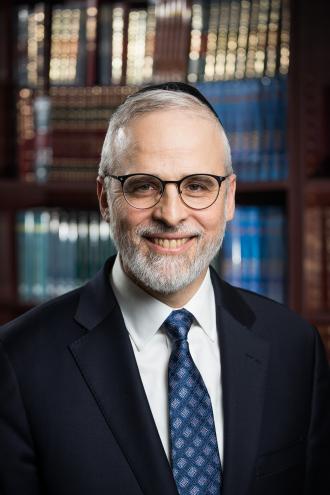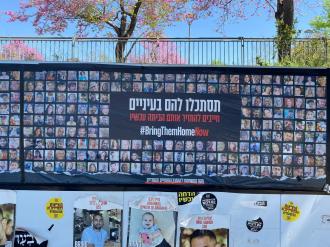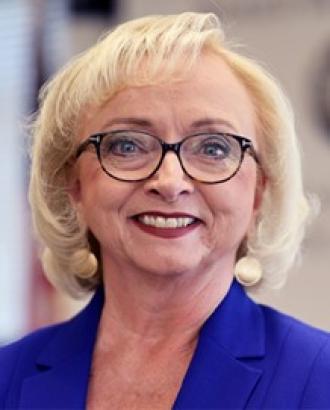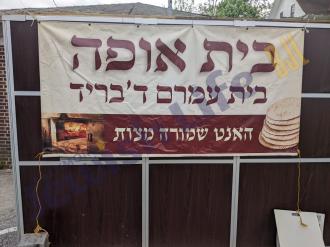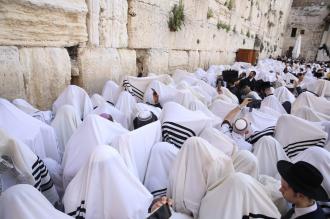Baltimore, Md - May 11, 2016 - 3 Iyar 5776:
Dear Friends,
Today we mark Yom Hazikaron on which we remember the 23,477 victims of terror and soldiers who have fallen establishing and defending the State of Israel. We are privileged to live in a time when the Land of Israel is accessible and open to us all. We are privileged to have a modern day State that upholds the pillars of democracy and freedom for all its citizens. This gift came with a heavy price. The price of precious neshamos who gave their lives for their people and their land. Often these days of Yom Hazikaron and Yom Haatzmaut are fraught with intense dialogue regarding the role of the State of Israel in the continuum of Messianic redemption. No matter what your personal or hashkafic feelings may be – one thing is clear – we have been granted a magnificent gift. We don’t have to sneak over borders or swim from afar to enter the Land of our Forefathers. We don’t have to close our eyes and imagine what the Kotel, Me’aras HaMachpeyla or Tzefas look like; we can go. We can touch the stones and walk the paths. We can see the beautiful proliferation of yeshivos, kollelim and institutions of Torah. We can stand by the Jordan River and see the very spot where our ancestors crossed into the land. We can climb Masada, swim in Ein Gedi and tour Ir David. We can taste the delicious fruit of the Shivas HaMinim (7 Species) and sample the award winning wines. We can marvel at the numerous chessed organizations and feel the warmth of being in the land of our people. We can land in Ben Gurion and feel the embrace of Hashem even before getting off the plane. This is the gift of Eretz Yisroel; this is the gift of Midinat Yisrael.
It is for this gift that we must thank the young men and women who have given their lives to ensure the continuity of our people and our land. It is for this gift that we express our condolences to their families as they mourn on this sacred day. It is for this gift that we say to the 23,477 precious neshamos for whom we mourn, b’damayich chayi, through your blood, through your sacrifice we will live, thrive and continue to build.
However, you choose to mark these days of Yom Hazikaron and Yom Haatzmaut – I ask you for two things. Today, stop and say a teffilah, give some tzedaka and perform an act of chessed for those who have sacrificed for us. Tomorrow, on Yom Haatzmaut, pause and thank Hashem for the gift of our national homeland. Thank Hashem for our little piece of Olam Haba in the midst of a tumultuous Olam Ha’zeh. Thank Hashem for allowing us to live in a time where we have the opportunity to contemplate making aliyah. Find a moment to thank Hashem for allowing us to find the inner peace of knowing that we can always come home.
With much blessing and ongoing hope for the arrival of Moshiach,
Rabbi Shmuel Silber
P.S. I have attached two moving article about Yom Hazikaron – I hope they will help you connect with this important day.
###
'Zikaron'
YISHAI FLEISHER
05/10/2016
In March of 1995 my friends and I were drafted to the Israeli army. We had passed some grueling tests and were accepted to the Paratroopers Brigade, the Tzanchanim. Together with so many other Israeli children, the image of the red berets liberating the Western Wall had been fused into our psyches, and more than anything we wanted to serve our country honorably and to the best of our abilities.
Six painful months of basic training were ahead of us. In this period our minds and bodies were converted from civilian use and became the property of the IDF. We learned to push the envelope of our individual capacities, and to harness the great strength inherent in a united group.
All this time we kept our sights on the final day of basic training in which we would hike 86 kilometers, in utter silence with full infantry gear, to Ammunition Hill in Jerusalem, where many Tzanchanim perished in 1967 and where we would receive our very own red berets and be inducted into the ranks of the paratroopers.
However, one fine day in May, barely three months after we began basic training, the pit bull-like sergeant major came into our barracks with a large box. We had no clue what its contents were.
The sergeant major proceeded to open the box, and much to our surprise, unveiled red berets for each one of us. “You don’t deserve to be paratroopers yet,” he told us. “But tomorrow you will leave the base and think of yourselves as full-fledged Tzanchanim for one day. You will not get to keep these, but wear them with pride and respect.”
The next day was Yom Hazikaron, Remembrance Day, and the whole of the brigade, thousands of men, would be released for one day to attend one of the many commemorations of fallen soldiers that take place every year in the cemeteries of this tiny nation. Each of us was given precise directions to the cemetery, and a plot number was also given to us. We were told that the plot number corresponded to a grave of a fallen paratrooper. We were ordered to stand next to that grave and next to the family of a young man who was once just like ourselves, wearing our red beret as he once did, and in a sense to represent his memory and soul.
That day I had luck hitchhiking, the preferred mode of travel when in uniform. Hitchhiking is by no means a precise science, and though I had tweaked my “I’m a helpless soldier” stance to perfection, some days were better than others.
I reached the gates of the cemetery about an hour early, and the place was quiet and serene.
I smoked a cigarette at the gate and then wandered in. The large space echoed with silence, the only sound being the birds chirping in the trees. Nature had overtaken this resting place and many of the walls were covered in ivy. I tried listening to the graves and heard no cries of pain, no last words and no fear of death. The dead, it seemed to me, had made peace with their fate, and were no longer bitter at having fallen so young. Alone among my dead I stood, a bit in a daydream, under the sun.
Soon, people began to arrive and I straightened my stance and made sure my beret was on right.
I was nervous at meeting the family I had been assigned to. Who would they be? How would they react to me? Would they cry next to me? Ask who I was? Most of all my soul wondered: what is it like for a parent to stand on the grave of their child? How would my parents feel if I were that child? How would I feel, if it were my child? I thought about my own mother and her reservations about my army service.
Soon after, I spotted a family of three: father, mother and son, heading in my general direction.
It was my family.
They greeted me kindly, and indeed the father did ask me who I was and where I served. The mother, who had been through this before, brought out some fruits and water to nourish the soldier standing in front of her, and though she looked at me I could see that her mind was far away, and that I was a painful reminder of her longing to nourish her own child.
As the somber ceremony began, once again I eyed my surroundings, and saw families standing by graves all around me. Interspersed among them were other red berets, for only the Paratroopers Brigade has this custom of representing its fallen.
At this moment more than any other, tears welled up, for I realized that this was about more than the personal tragedy of one fallen paratrooper, but was rather the day all of Israel remembered those who had laid down their lives in the attempt to build a home for the Jewish people. The red berets standing at the cemetery that day represented to me that successful effort of rebuilding the home we had lost so long ago. The dead came back to life in the form of a new generation of young soldiers who stood at the graves on the land which God had promised them. While the living cried, the dead now rested eternally in the bosom of Eretz Yisrael, the Land of Israel.
My adopted family was now in tears and the horns blared and reverberated through the cemetery, signifying the moment of silence and memory that had finally come. “Hhhhhhhmmmmmm,” like a primordial hum or the sound of a shofar; the Jewish soul cannot fight back tears.
In that one moment I felt gratitude: I am so thankful to you, fallen tzanchan, fallen Jew, fallen brother. Without you my parents would have had no place to run to from the choke-hold of the Soviet Union. Without you Jews of the world would never have shelter, and without you I would not be standing here today, wearing this uniform and the red beret that did not yet belong to me.
Then-foreign minister Shimon Peres finished speaking and the ceremony was over. The family thanked me for coming. They looked down onto their son’s grave and God only knows what went through their minds. They walked away slowly, the mother leaning on her husband, noticeably weaker than when she entered. I would probably never see them again.
“Shalom,” I said to myself.
Seven months after this story took place, Tom Kareen, one of the company’s commanders, was killed in a Hezbollah ambush. Also in that altercation, Yoav Be’er, an outstanding soldier in the second platoon, lost an eye and a leg.
Kareen and I did not get along too well throughout most of our service. However, a few weeks before his death, as I stood at a guard post I saw him from a distance leading other soldiers while he carried a radio on his back. He saw me too, and from that distance he waved broadly, with a big smile, as if to say, “Shalom, friend, there is peace between us.” That wave struck me as being uncharacteristic of army behavior and it made me feel human again if only for a bit.
When he was killed, the battalion commander came to speak with us. He shared our sadness but told us not to show it at the funeral. He said: “The enemy should not see you weeping like babies in front of the cameras, we are an army, and death is a part of it.” I knew that he was right.
Tom was buried in the soil of his home kibbutz, Ginosar, on the shores of the Sea of Galilee, the Kinneret. It was the most beautiful cemetery I had ever seen. It was hard to fight back tears at the funeral as per orders, especially when Tom’s fiancée eulogized her man with such warm words and tears. Today is the day of memory and the time for those tears.
The writer is the international spokesman for the Jewish Community of Hebron.
###
Bereaved families open their hearts about their loss at OneFamily
Remembrance Day ceremony
“I am often beset by a powerful longing which I cannot suppress, so that suddenly I feel like screaming, but I know there’s no point because who will understand me and so I decide to be silent.”
These were the words of Aviya Turgerman Tuesday night at the OneFamily Remembrance Day ceremony in Jerusalem about his brother Evyatar, who was killed in combat during Operation Protective Edge in Gaza in July 2014, aged 20.
The OneFamily organization is dedicated to providing year-round support services for bereaved families from Israel’s wars or terrorist attacks, as well as to victims of terrorism and violence themselves.
On Tuesday night, after the memorial siren had sounded, seven people whose lives have been irreversibly impacted by the loss of a father, mother, husband brother, son or other close member of their family, took to the podium at the OneFamily event to describe their life since the time when their loved ones were taken from them.
The ceremony was wrought with raw emotion, the memories of some victims who have been murdered in the recent spate of terrorism not even a year old, with speakers and members of the audience alike choking back the tears.
Aviya described the loneliness he felt with the loss of his brother, and his longing for him which he says get stronger and is not passing with time, and of how he feels unable to be comforted by friends and even family.
“Just three months before you fell, we danced together at my wedding and time has passed since you fell in battle and I have a son, Eitam, who is ten months old and it saddens me so much that you don’t know him,” he said.
Speaking about the transition between Remembrance Day and Independence Day he said was something that was extremely difficult for him. “I could not just wash my face, wipe away the tears and move on. My memorial day for Evyatar is not over! For us, Memorial Day is our every day.” Aviya thanked OneFamily however for providing him with a space within which to share his story and for bringing him together with others who can understand his pain. “Here we feel less alone and the feelings of loneliness disappear for a while.”
Adelle Bennett, whose husband Aharon was murdered in one of the first terror attacks of the current wave of Palestinian violence in October last year, was another of the speakers.
She talked about the difficulty of the last seven months, recovering from serious stab wounds she herself sustained, being unable to breast-feed her baby daughter or to take care of her son while always missing her husband. “Everyday, I wake up and want to crawl back into bed and break-down,” said Adelle. “I don’t want to get up but then I ask myself what is the purpose of today? I feel very lonely. She talked of her fondest memories of Aharon, of how he came home everyday to have lunch and how they shared this time together. “Suddenly, every lunchtime is now so lonely and I have no one to wait for to come home.
“I feel that I am living with constant movement between life and death; between the question of why and how this happened to how I can continue to live, when it feels so hard and I have so little strength to get up and live.” Adelle talked of how her two-year old son Natan is continually looking for references to his father, holding up a toy and asking if his dad had bought it for him, or asking if his father is part of a story book his mother is reading to him.
Moshe [Moshiko] Davino, 20, was killed during Operation Protective Edge while on combat duty with his Combat Engineers unit in Gaza. His mother Ruhama described the birthday message she had received from Moshe just before he went into Gaza, where he wished her much happiness and laughter for the future and to always keep smiling and joking with the family. “Thank you for always being there for us. Stay just the way you are. The best mother in the world” he wrote to his mother. “I wish that every child could have a mother like you, who worries and helps and does everything on her own. The main thing, continue smiling.” Ruhama described how she felt she may be receiving her son’s will when she read his message and how in the following three weeks before he was killed he tried to reassure her he would be ok. “I won’t talk a lot about the huge hole and the longing. Everyone here knows it,” she said. Ruhama described how she nevertheless felt the presence of her son, Moshiko, still with her and how this feeling keeps her going. “His spirit is still alive and well. Without this feeling, I don’t know whether it really is possible to get up in the morning, to breathe, to eat, to walk. Moshiko is with me. Moshiko left me a will. Moshiko asked me to continue onward, to smile, to love, and to watch over all the children. And every morning, every evening, I stand and look at the blessing that sits in a large frame in my home, and I continue onward, continue what Moshiko asked of me, continue my life, continue to see my other children, continue to see my husband, continue to raise and educate generations of children as part of my work – as his will to.” She also had warm words of praise for OneFamily. “Thank you to each and every one of you for your warmth, your giving and your love. Thanks to you, we are continuing onwards,” she said of the organization and its staff.”
Chantal Belzberg, CEO and founder of OneFamily, noted the intimacy of the ceremony and said it was focused on having the bereaved families share their experiences and to help them cope with their loss. “It’s a very personal ceremony, where people talk about what they’re going through, It’s raw emotion, as people open up their hearts and share everything inside of them,” said Belzberg. “These are families we are in touch with all year, we are working with them, holding their hands and are there for them.”







